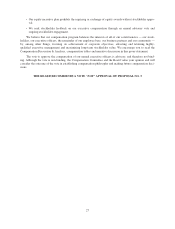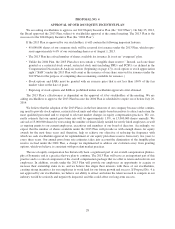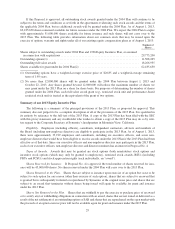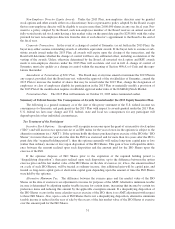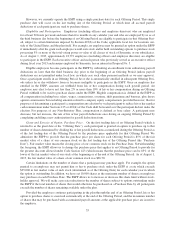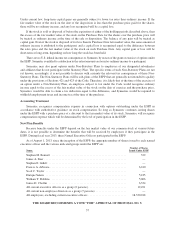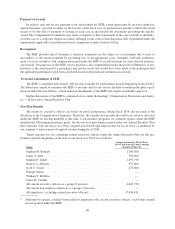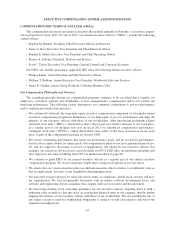Symantec 2013 Annual Report Download - page 47
Download and view the complete annual report
Please find page 47 of the 2013 Symantec annual report below. You can navigate through the pages in the report by either clicking on the pages listed below, or by using the keyword search tool below to find specific information within the annual report.
Under current law, long-term capital gains are generally subject to lower tax rates than ordinary income. If the
fair market value of the stock on the date of the disposition is less than the purchase price paid for the shares,
there will be no ordinary income, and any loss recognized will be a capital loss.
If the stock is sold or disposed of before the expiration of either of the holding periods described above, then
the excess of the fair market value of the stock on the Purchase Date for the shares over the purchase price will
be treated as ordinary income at the time of the sale or disposition. The balance of any gain will be treated as
capital gain. Even if the stock is disposed of for less than its Purchase Date fair market value, the same amount of
ordinary income is attributed to the participant, and a capital loss is recognized equal to the difference between
the sales price and the fair market value of the stock on such Purchase Date. Any capital gain or loss will be
short-term or long-term, depending on how long the stock has been held.
There are no U.S. federal income tax consequences to Symantec by reason of the grant or exercise of options under
the ESPP. Symantec is entitled to a deduction to the extent amounts are taxed as ordinary income to a participant.
Symantec may also grant options under Non-Statutory Plans to employees of our designated subsidiaries
and affiliates that do not participate in the Statutory Plan. The specific terms of such Non-Statutory Plans are not
yet known; accordingly, it is not possible to discuss with certainty the relevant tax consequences of these Non-
Statutory Plans. The Non-Statutory Plans will be sub-plans of the ESPP that are generally not intended to qualify
under the provisions of Sections 421 and 423 of the Code. Therefore, it is likely that at the time of the exercise of
an option under a Non-Statutory Plan, an employee subject to tax under the Code would recognize ordinary
income equal to the excess of the fair market value of the stock on the date of exercise and the purchase price,
Symantec would be able to claim a tax deduction equal to this difference, and Symantec would be required to
withhold employment taxes and income tax at the time of the purchase.
Accounting Treatment
Symantec recognizes compensation expense in connection with options outstanding under the ESPP in
accordance with authoritative guidance on stock compensation. So long as Symantec continues issuing shares
under the ESPP with a purchase price at a discount to the fair market value of its stock, Symantec will recognize
compensation expense which will be determined by the level of participation in the ESPP.
New Plan Benefits
Because benefits under the ESPP depend on the fair market value of our common stock at various future
dates, it is not possible to determine the benefits that will be received by employees if they participate in the
ESPP. During fiscal year 2013, three Named Executive Officers participated in the ESPP.
As of August 1, 2013, since the inception of the ESPP, the aggregate number of shares issued to each named
executive officer and the various indicated groups under the ESPP are:
Name:
Number of Shares
Issued Under ESPP
Stephen M. Bennett ................................................... 522
James A. Beer ........................................................ —
Stephen E. Gillett ..................................................... —
Francis A. deSouza .................................................... 6,240
Scott C. Taylor ....................................................... —
Enrique Salem ....................................................... 5,185
William T. Robbins ................................................... 5,006
Janice D. Chaffin ..................................................... 6,334
All current executive officers as a group (6 persons) .......................... 12,491
All current non-employee directors as a group (7 persons) ..................... —
All employees, excluding current executive officers .......................... 18,330,018
THE BOARD RECOMMENDS A VOTE “FOR” APPROVAL OF PROPOSAL NO. 5.
37


